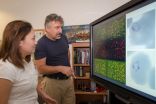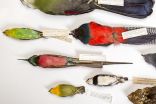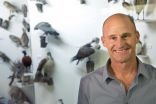(Press-News.org) A Texas Tech University biologist led a team of more than 50 scientists who mapped the genomes of three crocodilians.
By mapping these genomes, scientists may better understand the evolution of birds, which are the toothy predators' closest living relatives, said David Ray, an associate professor of biology. The team completed genomes of a crocodile, an alligator and a true gharial to complete the genomic family portrait.
Their research, largely funded by the National Science Foundation, will appear Friday (Dec. 12) in the peer-reviewed journal, Science.
"One of the major finds in our case was that crocodilian genomes change very slowly when compared to birds," Ray said. "We compared both birds and crocodilians to turtles, which are the closest living relatives of the group that includes both birds and crocodilians. We found that they evolved slowly also. The best explanation for this is that the common ancestor of all three was a 'slow evolver,' which in turn suggests that rapid evolution is something that evolved independently in birds."
Research began in 2009 as an attempt to map only 1 percent of crocodilian DNA. However, shortly after starting, the price for mapping a million bases dropped from $1,000 eventually down to $1.
"We had proposed to sequence about 2.4 million bases from the three crocodilians in the original proposal," Ray said. "By the time we got the funds, it became clear that we could easily accomplish a thousand times that much and could afford to sequence an entire genome of 3 billion bases."
Ray said that when biologists look at a group of organisms, they look for what makes that group unique as well as what all members of one group of organisms share that other groups do not. The best way to do that is to examine their closest relatives.
"Technically, birds' closest relatives are the dinosaurs," he said. "So we can only look at their fossils and this can provide only limited information on their biology when compared to examining organisms that are alive today. We get insight into differences in behavior, structures that don't fossilize, and in our case, the makeup of the genome."
Ray said he and other scientists were surprised to see how genetically uniform the alligators that the group sequenced were. Initially, the group suspected severe hunting during most of the 20th century may be to blame.
"Because alligators underwent a severe population decline, we first thought that might be what happened," he said. "However, we see the same pattern in all three species and the likelihood that all three were subject to the same genetic bottlenecks is small. We suggested instead that change just occurs slowly in crocodilians. In other words, it wasn't that the genetic differences were reduced because of overhunting. Rather, the amount of variation in crocodilians is low because change simply occurs slowly in these genomes."
The DNA in alligators, crocodiles and gharials is about 93 percent identical across the genome. By comparison, a human shares about 93 percent of his or her DNA with a macaque.
"The difference is that humans and macaques shared a common ancestor around 23 million years ago while alligators and crocodiles shared a common ancestor in the much more distant past, around 90 million years ago," he said. "That means that things are changing in primate genomes about four times faster than in crocodilians."
Ed Green, an assistant professor of biomolecular engineering at University of California, Santa Cruz, has worked on several mammalian genomes, including that of Neanderthals. He said he didn't expect such slow genetic changes seen in these reptiles.
"Crocodilian genomes are really interesting because they appear to have changed so little over time," Green said. "From the perspective of someone who knows a lot about mammalian genomes, reptiles are strange in how static they are. Crocs and gators are especially static.
"Like most genome projects, the assembly and annotation is only the beginning. There is some fascinating biology in Crocodylia like temperature-dependent sex determination. Male and female crocodilians are genetically identical, and we'd love to know how that works. We're also now in the position to start looking hard at the genomes of the common ancestor of crocs and birds. Not much is known about the biology of this creature, called an archosaur. But we may hope to learn a lot about it by reconstructing its genome from the living genomes of its living descendants, the crocs and birds."
INFORMATION:
Find Texas Tech news, experts and story ideas at Texas Tech Today Media Resources or follow us on Twitter.
Contact
David Ray
Associate professor of biology
Texas Tech University
(806) 834-1677
david.a.ray@ttu.edu.
Scientists from Nanyang Technological University (NTU) have discovered exactly how the malaria parasite is developing resistance towards the most important front-line drugs used to treat the disease.
Malaria is a mosquito-borne parasite which affects over 60 million people worldwide and in serious cases, can be fatal. There is currently no viable vaccine for malaria while antimalarial drugs and prophylaxis are losing its efficacy with increasing drug resistance.
NTU Associate Professor Zbynek Bozdech, who led an international research team from 11 different countries, ...
The first findings of the Avian Phylogenomics Consortium are being reported nearly simultaneously in 28 papers -- eight papers in a Dec. 12 special issue of Science and 20 more in Genome Biology, GigaScience and other journals. The full set of papers in Science and other journals can be accessed at avian.genomics.cn
Scientists already knew that the birds who survived the mass extinction experienced a rapid burst of evolution. But the family tree of modern birds has confused biologists for centuries and the molecular details of how birds arrived at the spectacular biodiversity ...
New research from the University of Kent suggests that chickens and turkeys have experienced fewer gross genomic changes than other birds as they evolved from their dinosaur ancestor.
Professor Darren Griffin and a team at the University's School of Biosciences have conducted research that suggests that chromosomes of the chicken and turkey lineage have undergone the fewest number of changes compared to their ancient avian ancestor, thought to be a feathered dinosaur.
The Kent research is part of a study by a consortium of leading scientists into avian or bird genomes, ...
An international team of scientists has completed the largest whole genome study of a single class of animals to date. To map the tree of life for birds, the team sequenced, assembled and compared full genomes of 48 bird species representing all major branches of modern birds including ostrich, hummingbird, crow, duck, falcon, parrot, crane, ibis, woodpecker and eagle species. The researchers have been working on this ambitious genetic tree of life, or phylogeny, project for four years.
As part of the Avian Phylogenomics Consortium -- comprised of more than 200 scientists ...
NEW YORK, NY (December 11, 2014) Growing resistance to malaria drugs in Southeast Asia is caused by a single mutated gene inside the disease-causing Plasmodium falciparum parasite, according to a study led by David Fidock, PhD, professor of microbiology & immunology and of medical sciences (in medicine) at Columbia University Medical Center.
This finding provides public health officials around the world with a way to look for pockets of emerging resistance and potentially eliminate them before they spread.
Though malaria deaths have dropped by 30 percent worldwide since ...
Targeted therapies are a growing and groundbreaking field in cancer care in which drugs or other substances are designed to interfere with genes or molecules that control the growth and survival of cancer cells. Now, scientists at Virginia Commonwealth University Massey Cancer Center and VCU Institute of Molecular Medicine (VIMM) have identified a novel interaction between a microRNA and a gene that could lead to new therapies for the most common and deadly form of brain tumor, malignant glioma.
In a study recently published in the journal Neuro-Oncology, a team of scientists ...
Advances in treatment for human immunodeficiency virus (HIV) have made it possible for people with HIV to survive much longer. As they age, however, many experience impaired thinking, memory loss, mood swings and other evidence of impaired mental function.
To stop these changes, scientists have to learn what is causing them. One possibility researchers are considering is that long-term infections with other pathogens, common in HIV-positive patients, are affecting the brain. But a new study has eliminated one of their prime suspects: the hepatitis C virus, which infects ...
Lincoln, Neb., Dec. 11, 2104 -- A University of Nebraska-Lincoln researcher has contributed to discoveries about bird evolution as part of a new study that sequenced the complete genomes of 45 avian species.
Published Dec. 11 in the journal Science, the study found that avian genomes -- the complete archive of genetic material present in cells -- have exhibited surprisingly slow rates of evolution when compared with their mammalian counterparts.
Jay Storz, a Susan J. Rosowski Associate Professor of Biological Sciences, led a research group that assisted the study by examining ...
The fruits and vegetables provided at school deliver an important dietary boost to low income adolescents, according to Meghan Longacre, PhD and Madeline Dalton, PhD of Dartmouth Hitchcock's Norris Cotton Cancer Center and The Hood Center for Children and Families. In a study released in Preventive Medicine, Longacre and Dalton found that fruit and vegetable intake was higher among low income adolescents on days when they consumed meals at school compared to days when low income adolescent were not in school. The opposite was true for high income adolescents who consumed ...
PITTSBURGH--The 2013 Boston Marathon bombing motivated mass expressions of fear, solidarity, and sympathy toward Bostonians on social media networks around the world. In a recently released study, researchers at the University of Pittsburgh and Cornell University analyzed emotional reactions on Twitter in the hours and weeks following the attack.
The study is the first large-scale analysis of fear and social-support reactions from geographically distant communities following a terrorist attack. The findings show the extent to which communities outside of Boston expressed ...




